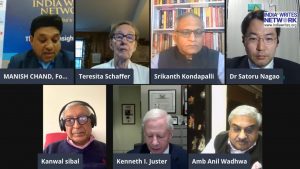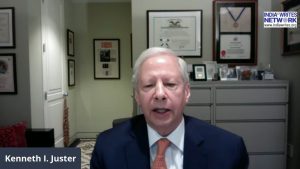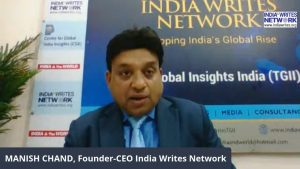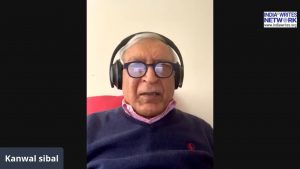
The Quad grouping of India, US, Japan and Australia is set to move beyond China fixation to diversify its agenda which will have more economic content rather than security and geopolitical, said eminent ex-US and Indian diplomats at an online conference.
Five days after the first in-person Quad summit held in Washington on September 24, there is a growing convergence among four major democracies that the Quad should develop positive and constructive agenda pivoted around improvement in the lives of people and their developmental aspirations. This is the predominant impression that emerged from the webinar organised by India Writes Network, India and the World magazine and, Centre for Global India Insights (CGII), a think tank focused on foreign affairs, on September 29.
https://www.youtube.com/watch?v=SE1MoKWYQ4k
While the Quad will focus on forging a forward-looking agenda, US’ former Ambassador to India Kenneth Juster cautioned that in case Chinese aggression will continue, it will energise the Quad further and made a strong pitch to the US and India to join a maga-trade bloc to check Beijing’s economic domination of the region.

“While the Quad is not focused explicitly on China, to the degree that Chinese continue to be aggressive in their actions, you’re going to see continued energy in the Quad,” said Mr Juster. “There is absolutely no doubt that as the Chinese behaviour has become more aggressive in the region, including on the northern border with India, but also in the South China Sea, the East China Sea, some claims in Bhutan and elsewhere, this has energized the Quad, and in particular India’s enthusiasm and participation in it,” said Mr Juster. He was responding to a question on how far the Quad can bolster Quad countries’ capacity to deal with China.
Besides Mr Juster, eminent speakers at the power-packed panel discussion included Kanwal Sibal, former foreign secretary of India, Teresita Schaffer, former US Deputy Assistant Secretary of State for Northeast and South Asia, Anil Wadhwa, Former Secretary (East), Ministry of External Affairs, India; Prof. Srikanth Kondapalli, China expert at Jawaharlal University (JNU) and Satoru Nagao, Fellow Hudson, Institute.
Speakers agreed that while China will continue to be the subtext, the Quad is set to develop into an organisation focused on economic and development cooperation among the four major democracies. “The Quad will make important contributions to the economics of the region and therefore to the security of the region,” said Teresita Schafer, former US diplomat dealing with South Asia and the author of India at The Global High Table.
“The areas they have picked out for special emphasis after the most recent summit – vaccines, infrastructure and critical technology supply chains — are tremendously important,” said Ms Schaefer, who joined the online discussion from Washington DC.

The webinar was moderated by Manish Chand, CEO & Director, Centre for Global Insights India (CGII) and IWN. Setting the context, Mr Chand said that the webinar aimed at dismantling stereotypes about the Quad as primarily a China-containment grouping or a gang-up against China. Beijing has bitterly dismissed the Quad as an Asian Nato. “The last two Quad summits, virtual and physical, have tried to dismantle China-centric cliches by branding and positioning the Quad as a force for global good, in Prime Minister Narendra Modi’s words,” said Mr Chand.
Gains for India

Kanwal Sibal, India’s former foreign secretary and well-known writer on strategic affairs, underlined that the Quad will benefit India in many ways. “The rapidity with which the Quad agenda has been enlarged and deepened with full Indian participation signals that the Quad will continue to play an increasing role in India’s strategic and economic thinking,” said Mr Sibal.
Mr Sibal supported the focus of the Modi government in shaping a positive agenda for the Quad. India has favoured the new Quad agenda, he said. He argued that the Quad should not be considered purely as a security framework as it would then give ammunition to China to talk about an Asian NATO and try to create mistrust in the ASEAN countries toward this new formation, and use the argument that ASEAN is being sidelined and ASEAN’s earlier role as being central to the emerging Asian security architecture was being weakened.
“Which is India and other partners are emphasizing the centrality of ASEAN because if ASEAN becomes seriously divided over the issue, then the Indo-Pacific strategy cannot work as well as we would like it to,” he said.
India, US should sign TPP: Juster
Focusing on the economic aspect of the Quad, Mr Juster argued that it’s important for India to bolster its economic power, which has been dented by the pandemic, to play a more proactive role in shaping the Quad. In this context, the envoy exhorted India and the US to sign Comprehensive and Progressive Trans Pacific Partnership Agreement (CPTPP) to curb China’s ambitions for economic hegemony. Mr Juster’s exhortation came days after China announced its intention to join Comprehensive and Progressive Trans Pacific Partnership Agreement (CPTPP).
Alluding to the withdrawal of India and the US from trade pacts, including RCEP and TPP respectively, the former US diplomat underscored that “this leaves the economic domain largely to China, both in terms of setting the rules for regulatory standards, for developing the supply chain relationships, and for continuing to be the key economic player, which leads to broader strategic power in my view.”
“The United States and India need to consider potentially acceding to and joining the TPP perhaps with some modifications to it,” he said.
Based on a careful reading of the joint statement released from the latest Quad summit, Prof. Srikanth Kondapalli highlighted how references to “regional security becoming complex” and “members being daunted by coercion” were indirect references to China. He highlighted how various capacity buildup measures mentioned in the Quad joint statement — while obviously beneficial to India — has the potential to dwarf Chinese influence in the region.
Author Profile
- India Writes Network (www.indiawrites.org) is an emerging think tank and a media-publishing company focused on international affairs & the India Story. Centre for Global India Insights is the research arm of India Writes Network. To subscribe to India and the World, write to editor@indiawrites.org. A venture of TGII Media Private Limited, a leading media, publishing and consultancy company, IWN has carved a niche for balanced and exhaustive reporting and analysis of international affairs. Eminent personalities, politicians, diplomats, authors, strategy gurus and news-makers have contributed to India Writes Network, as also “India and the World,” a magazine focused on global affairs.
Latest entries
 DiplomacyJanuary 5, 2026India walks diplomatic tightrope over US operation in Venezuela
DiplomacyJanuary 5, 2026India walks diplomatic tightrope over US operation in Venezuela India and the WorldNovember 26, 2025G20@20: Africa’s Moment – The Once and Future World Order
India and the WorldNovember 26, 2025G20@20: Africa’s Moment – The Once and Future World Order DiplomacyOctober 4, 2025UNGA Resolution 2758 Must Not Be Distorted, One-China Principle Brooks No Challenge
DiplomacyOctober 4, 2025UNGA Resolution 2758 Must Not Be Distorted, One-China Principle Brooks No Challenge India and the WorldJuly 26, 2025MPs, diplomats laud Operation Sindoor, call for national unity to combat Pakistan-sponsored terror
India and the WorldJuly 26, 2025MPs, diplomats laud Operation Sindoor, call for national unity to combat Pakistan-sponsored terror







